
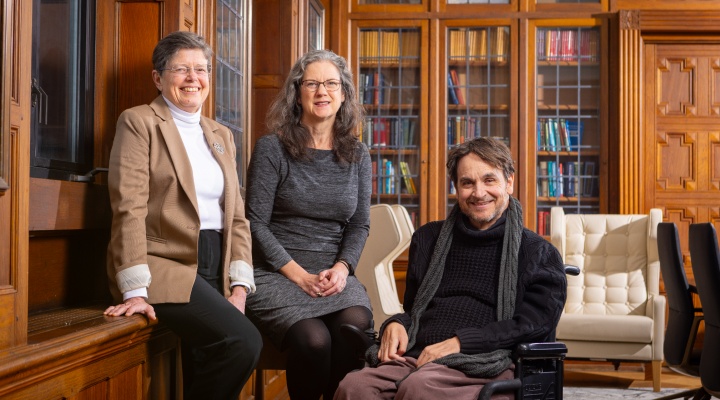
In this Issue:
Support your Department
Co-investigators on the grant from the Mellon Foundation are, from left, Jo L. Freudenheim, Victoria Wolcott and Michael Rembis. The grant supports a new interdisciplinary research project that seeks to better understand and address issues faced by caregivers and those with disabilities.
Photographer: Douglas Levere
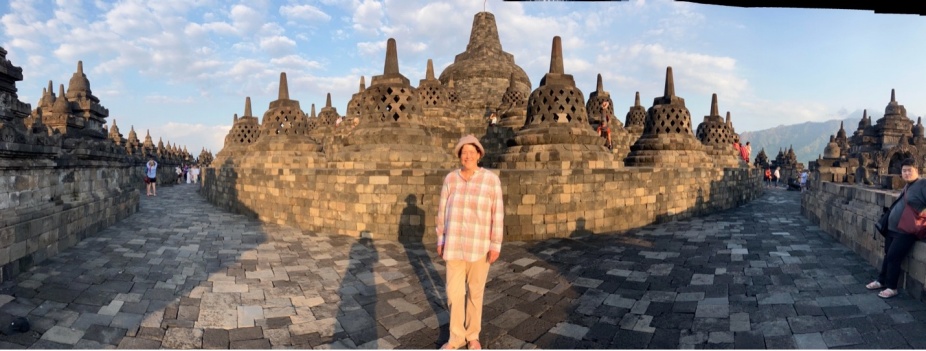
Kristin Stapleton, Professor and Chair, at Borobudur in Indonesia.
Greetings from Park Hall! The past year has been action-packed for the department. We were able to recruit a new colleague to Buffalo: Dr. Oge Williams, a specialist in the history of medicine and gender in Africa. You can learn about her work in this newsletter. Pablo Mitchell, our inaugural Lockwood Professor of Latinx History, decided to return to Oberlin, unfortunately, but we enjoyed getting to know him during the year he spent in Buffalo and wish him well. Süleyman Demirci returned to Turkey after his year as a visiting professor in the department, during which he taught a fascinating course on the early centuries of the Ottoman Empire. We also wish him well. A member of our staff, Shayna Devlin, left UB and Buffalo, but we gained two new staff colleagues, Amy Christensen and Jen Darlak, who have made huge contributions to the work of the department. Michelle Burger continues to serve as our outstanding Department Administrator. I thank our PhD candidate, Kevin Kostin, who serves as Departmental Communication Assistant this semester and helped produce this newsletter.
In April 2024, our inaugural Wozniak Lecture, supported by a generous legacy from the Wozniak family, was delivered by David Nirenberg, the Director of the Institute for Advanced Study in Princeton. The topic was “The Ancient History of Race and Religion: From Seed of Enlil to Seed of Abraham.” On April 4, 2025, the second Wozniak Lecture will feature Yale historian Valerie Hansen on “The Asian Age of Exploration: When Spices and Ceramics Traveled Halfway Around the World.” We hope you will save the date and join us here in Buffalo for the talk. Please keep an eye out early in 2025 for registration information!
The rest of this newsletter will update you on all the scholarly activities of our alumni, current students, and faculty. For me personally, it has been an interesting year. As you see in this photo, I visited Borobudur, a UNESCO Heritage Site in Yogyakarta, Indonesia. I’ve long taught about the spread of Buddhism across Asia, so it was a great pleasure to see one of the most striking Buddhist historical centers up close. I also enjoyed talking with and interviewing alumni from various eras in UB’s past as part of a departmental history project I am conducting with help from students. Our department has produced some remarkable talents and will continue to do so, I hope, for many, many years!
Kristin Stapleton
Professor and Chair
On April 4, 2025, the second Wozniak Lecture will feature Yale historian Valerie Hansen on “The Asian Age of Exploration: When Spices and Ceramics Traveled Halfway Around the World.” We hope you will save the date and join us here in Buffalo for the talk. Please keep an eye out early in 2025 for registration information!
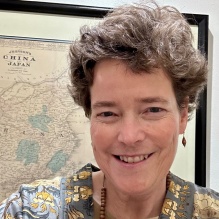
Kristin Stapleton
Professor and Chair
Jacobs School hosts international conference of the Alcohol and Drugs History Society
Leading researchers from around the world met at the Jacobs School of Medicine and Biomedical Sciences at the University at Buffalo June 27-29, 2024, for the 8th biennial meeting of the Alcohol and Drugs History Society.
UB faculty and 130 scholars from across the U.S. and the world showcased their research and accomplishments in an expanding field of interest.
The conference explored the history and challenges of alcohol and drug use, production, and regulation in ways that analyze and guide our understanding and approach to emerging 21st-century issues, including the decriminalization of cannabis, “the psychedelic renaissance,” pharmaceutical patents, and the utility of policies like “the war on drugs.”
As a historian, I’m not going to tell you what to do, but I can explain what happened when people did the sorts of things you’re proposing now.
David Herzberg, PhD
Participants discussed how the history of drugs and empires, racialization and gendering, social movements, science and medicine, religion and other developments can inform current debate and policy.
“The history of alcohol and drugs displays strong patterns that are not at all random,” says David Herzberg, UB History professor and the conference host. “Knowing and sharing this history can help us from repeating patterns that have caused a lot of harm.”
And it’s not just the harm that drugs and alcohol can wreak on people and communities, according to Herzberg, who also co-edits the society’s journal.
“We also must consider the harm caused by ill-informed, poorly designed, or even malevolent drug policies,” he says.
An exclusive focus on supply-side prohibition is among those lessons.
“The history is unequivocal that, for example, focusing primarily on preventing the illicit smuggling of drugs into the U.S. had serious consequences,” says Herzberg. “The evidence is robust that this approach resulted in the supply increasing; the drugs becoming more powerful and dangerous; and the drug traffic itself becoming both more violent and closer to the U.S.”
The opioid crisis is another example of a pattern that had previously surfaced. Although there is no precedent for a crisis of this magnitude, there have been many times when new marketing strategies and innovations in global supply chains got ahead of systems to protect consumers, Herzberg says.
“Pharmaceuticals like sleeping pills and stimulants, for instance, produced a startling increase in addiction and overdose in the 1950s and 1960s, the largest before what we saw with opioids,” he says. “We could have been better prepared.”
Current debates tend to devolve into partisan politics, but the past offers a critical distance that can allow for more practical and realistic discussions.
“It’s the hope that having these conversations can inform policy makers,” says Herzberg. “As a historian, I’m not going to tell you what to do, but I can explain what happened when people did the sorts of things you’re proposing now.”
UB has received a $2.5 million grant from The Mellon Foundation in support of a new interdisciplinary research project that seeks to better understand and address issues faced by caregivers and those with disabilities.
The Communities of Care project derives inspiration from an existing, though informal, “communities of care” social strategy. This concept recognizes that care is delivered not only by the health care system, but additionally through significant community-level support systems within families, among friends, throughout neighborhoods, and other networks. In this context, the project focuses on those with disabilities and caregivers, who are frequently women of color.
“This transformational funding from the Mellon Foundation will give our researchers the ability to explore health inequities that profoundly impact caregivers in Buffalo. ”
Robin Schulze, dean of the College of Arts and Sciences
Meet our New Faculty
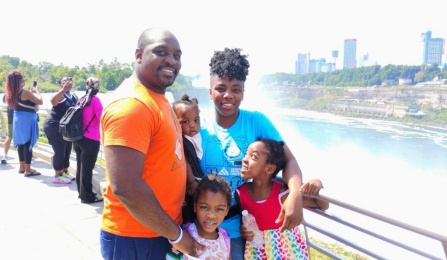
Ogechukwu Williams at Niagara Falls State Park with her family.
We sat down with Ogechukwu Williams, a new professor in the Department of History and author of "Birth Politics: Colonial Power, Medical Pluralism, and Maternity in Nigeria during the Twentieth Century" (Johns Hopkins University Press, 2025), to hear about her research, current projects, and how she’s been adjusting to living in Buffalo.
What are your areas of interest in teaching and research?
“My teaching and research are connected. I am interested in subjects of maternal health and reproduction, child birth and birth rituals, maternal deaths...but also medical activism, looking at ways that communities...different people have contested, advocated for, or protested health care and medicine or medical care. I’m also interested in the ways in which religion and spirituality affect medical decisions and the search for medical care. I would [also] say indigenous knowledge systems, especially as they relate to medicine. Wartime medicine...that’s another subject because for quite a long time I’ve explored the Nigeria-Biafra War, which led to an interest in ways that medical care has been delivered in times of conflict, particularly maternal and reproductive healthcare. These are subjects that I’m interested in on the teaching and research sides.”
How did you become interested in the history of childbirth, maternal health, and reproduction?
“I’ve always been interested in health and medicine for as long as I can remember, including during my childhood. And I was particularly fascinated with pharmacology to the extent that at one point as an undergraduate student, I actually sat for and passed a third-year pharmacology exam just because.... So, when I got the opportunity at the end of my undergraduate program, I worked for the National Reproductive Health and HIV and AIDS Scheme in the northern part of Nigeria. I wasn’t just working with them but I also volunteered as a peer education trainer, basically a mentor for young girls, girls that were in elementary or junior high school. During that period, I witnessed the intricacies of maternal health care, the challenges of maternal and reproductive health, in that region.... I could see the ways in which the cultures from that area, the politics of gender and the politics of religion, were all shaping the healthcare decisions and the kinds of care...the kinds of decisions, that were made for these young women’s health. I also saw that... on the advocacy side and the policy side, there was a disconnect with the historical causations...it wasn’t taking into account all of these long historical factors affecting maternal and reproductive health. This really got me interested in that subject, and I have pursued that interest ever since...in graduate school and beyond.”
What’s the “elevator talk” version of your forthcoming book Birth Politics – broadly speaking, what is it about?
“Well, the plain and simple description of Birth Politics...it looks at the history and politics of childbirth in Nigeria throughout the twentieth century. I explore the intersections, the interconnections, co-constitutions, but also the rivalries between three major actors here. There’s the traditional midwives and traditional doctors; the faith healers who gained prominence in the late 1920s during the moment of a public health crisis; and the biomedical practitioners who were introduced with the onset of colonialism and missionary medicine. I look at how all of these clashed, competed against each other, and intersected to shape what I describe as Nigeria’s birthscape...basically, the reproductive and maternal healthcare landscape, in colonial and post-colonial Nigeria."
Do you see the faith healers and traditional midwives you reference as existing in conflict with the biomedical industry in Nigeria? If so, are there areas of overlap or coexistence?
“There was really an example where what was happening in the faith healing realm really hurt the hospital. In the late 20s, early 30s, the missionaries had set up all of these hospitals as missionary work, but they were charging for those services. And then, the faith healers come along, and there was one very popular man, Joseph Babalola, who I talk about extensively in one of my chapters...he really changed the dynamics when it comes to faith healing in Nigeria. So, this man comes around with his revival services...the hospitals practically empty out, and then the missionaries were complaining. They actually wrote to the colonial government and they said, ‘look, hospitals have emptied, we’re in trouble, we’re not getting the revenue that we’re using to pay our pastors, to pay our priests, and to pay for these schools, and can you do something about this, can you find a way to get rid of this man?’ That dynamic, right there, ‘just do something, because what they’re doing is really, really affecting what we’re doing.’
But, especially in contemporary Nigeria, there’s a lot of those...it’s not always clashes, and I think because we’re talking about the post-colonial period, a period where Nigerians are in charge of the affairs of the government, of the hospitals, and all that, they also understand the cultural setting, the religious setting of this place. One of the things that’s happened is a situation where the hospitals have come to accept faith healers and faith healing. They know that a family might decide to go and bring a prophet or their pastor into the hospital to pray for a sick person, a patient that they’ve committed into the hands of the hospital, and it’s pretty much acceptable now. In some hospitals, especially the larger hospitals, they have days for that, dedicated for that, where pastors, and prophets, and evangelists, and whoever just come in through and are praying for patients. And then there are the few interesting cases where a doctor deals with a particular case and actually says to the patient, ‘look, this is beyond medicine, you need to take this person to a faith healer.’ So, there are dynamics like that, and then there are dynamics where...and of course, a lot of people won’t admit...doctors will not admit that openly, but it does happen. There are those referrals going the other way, not just the opposite direction, where they’re like ‘this is not something...I advise you to go find a prophet or a pastor or something because this is beyond us.’”
What are the lasting implications of colonialism on modern-day Nigeria, particularly as they relate to your research?
“When it comes to traditional medicine, there’s been a real missed opportunity in how its potentials have been addressed or harnessed, and this is all because of the legacies of colonialism. Under British colonial rule, people were taught to distance themselves from traditional medicine and many cultural practices, including naming, artistic forms, etc., while embracing the biomedical and Christian ways of thinking. There are remnants of that rhetoric in contemporary Nigeria, although people are beginning to draw a distinction between their cultural practices, indigenous medical frameworks, and Christianity.... How far this goes remains to be seen. And how far the state actually gets invested in empowering what there is to empower of traditional medicine is also left to be seen. Some states have advanced more in that regard than others, and those who have embraced elements of traditional medicine as part of their mainstream medical framework have met with some success. A good example is the state that integrated traditional midwives into the state's maternal healthcare outreach rather than focus on vilifying a system that is indispensable to the society for all kinds of reasons. Lagos state has done a lot in trying to build up traditional medicine, trying to bring training and empowerment ... to the parts that are viewed as beneficial. But how long this will be sustained is yet to be seen.”
What will you be teaching this year? What new classes might you teach in the future?
“In the spring I will teach HIS 314 - Modern Africa, and that’s a preexisting course, and 436 - Of Sickness, Health, and Domination: Medicine in Africa and the African diaspora, and chances are that I will teach this as Special Topics 403 if it doesn’t get approved in time for Spring registration. It is going through the approval process. As far as future courses, I have quite a number of courses that I’m very excited about. I’m working on a course on medical activism in Africa. If you remember, I did mention that my teaching and research interests intersect, and this is an example of that. One of the research projects I’m interested in, project number three, I hope, is on medical activism, and this course will basically look at communities’ responses to medical challenges over time... different ways that communities have responded to medical challenges, including through advocacy, protests, music and art forms, activism. I hope that this course will have a study abroad component where students will actually have the opportunity to participate in advocacy or health education work, health education campaigns, workshops, and then apply the histories, the very well-established histories, behind these campaigns... and the data that they collect on these histories with their field experience. This is a course that I’m hoping I will pull off and I’m looking forward to it.
I have another course that I’m actually creating...hopefully I can finish it soon and get it in the approval process in the next few months...but it’s called Reel Medicine. I’ve changed the subtitle quite a bit, I’m at Colonial and Post-Colonial Health Propaganda in Africa as the subtitle. We will look at African medicine and medical/health propaganda through films, but the exciting part for me, and I hope for students, is that they will get the opportunity to create digital artifacts, to create a video essay or minidocumentary, so it’s not just about looking at these histories through films, but then how do we take the amazing sources that we find, the primary documents, the data that we find for our research and use that for video essays or documentaries and tell a story that will appeal to a broader audience. This is a trend in historical scholarship today, especially for subjects like this, subjects of medicine, or of childbirth. If you want engagement with those subjects, then you need to be also able to take some of those stories, some of those data and information, and relay that in a format that the public can engage. This element is very important to me.”
How have you liked Buffalo – both the university and the wider community – since moving here?
“Ask me again after winter! But so far, we love it. We are outdoors people, so we love the extent of the things to do outdoors. For the first two months here, we were spending almost every weekend at some of the beaches. We’d go out to Angola Beach or some other one, Bennett Park, I think. My husband Adam is originally from California, so he’s a water person.... But here, we’ve got two Great Lakes, the Niagara River, it’s just amazing. And then we are not too far from Niagara Falls, that Fall is beautiful, we visited about four or five times in the short time we’ve been here. It's just amazing too to be able to go shopping in Canada...we love Costco...or go grab a bite in a favorite spot, if we want. And then the University...the Department is filled with a lot of good people. I really like that. The faculty, they have good reputations, not just as excellent scholars but as fantastic people. I can’t tell you the number of times before I decided to make this move to UB and people that I respect, notable scholars, have said ‘well, you have this person, that person, and that person, all in the same department, you’re good, you’re in good hands.’ And I see that, it’s just a good crowd. I like that I have a cohort of people doing medicine, that’s one of the strong suits of the department in my opinion...the specialty area of medicine and disability. So, having a cohort of people is wonderful, but having some really good people and excellent scholars, being surrounded by them, that’s wonderful. I really like that. I hope that we can build up a cohort for African history too. There's just a few programs in the country that are known for their African history program and this is a niche that we can build here in the department and UB as well. And the University...the University is large! It’s similar to my undergraduate institution, very similar to my graduate institution too, but I moved from a smaller institution to this, so I can tell the difference, and I know the advantages and disadvantages of being here, having gone to large institutions my whole life.... There’s a lot of resources and there’s overlaps to where you can visit ‘X’ office and you don’t really get what you want, well, there’s two other offices that kind of overlap with ‘X’ office; so I’m hoping to take advantage of that support as much as I can. I’m still trying to catch my breath! But when I do, I’ll figure out exactly what it is that I really want to prioritize and then just go for it, but there seems to be a lot of support for different things and a lot of resources for different things as well.”
Can you tell us something about yourself that we won’t find on your CV or on the website?
“I have an Etsy shop called ‘AfroAdornments,’ so I’m a very craftsy person...craftsy, artsy, and I create a lot of stuff. If you see me wearing an African print themed jewelry, earrings, I likely made them. If you see me carrying a raffia bag, I likely made it too. I create stuff. I weave, I do several things, to the point where Adam was like ‘you know what, why don’t you just create an Etsy shop and find an outlet,’ because I just create for the house and for the kids.... I sew too, so I sew for myself, I sew for the kids, and he’s like ‘create an Etsy shop and just do something with this!’ So, that’s something I do, especially as a way to clear my brain. It’s therapeutic for me. I will invoke Adam here again because he was pushing for that and he said ‘find something...what is it that you love doing, do it...don’t just be in your books all the time!’ and he started saying that from our graduate school dissertation days. Back in graduate school I bought a sewing machine and I just started doing my sewing and then had a craft station when I started working and just started creating my stuff. So, when my head is full, I just go to my craft station and I start creating something. If I can think it up, I just create it. Creating and my crafts station became a place that I centered myself. I don’t think you’ll find this anywhere on my biography!”
SUNY Distinguished Professor Jon Dewald to Retire
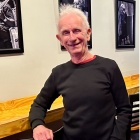
SUNY Distinguished Professor Jonathan Dewald, May 2024
Jonathan Dewald, an eminent scholar of early modern France, will retire in January 2025. Jon earned his PhD at the University of California at Berkeley and joined the UB Department of History in 1990, after having taught for sixteen years at UC Irvine. In 2002 he was named a UB Distinguished Professor and in 2017 a SUNY Distinguished Professor. He served as Department of History chair from 1990 to 1997.
Jon’s research focuses on the changing nature of elite status and life in early modern Europe. His "The European Nobility, 1400-1800" (Cambridge 1996) has been translated and published in several European languages as well as Chinese. His studies such as "Status, Power, and Identity in Early Modern France: The Rohan Family, 1550-1715" (Penn State, 2015) are based on meticulous archival work and informed by wide scholarly reading, while featuring both incisive analysis and graceful writing.
His colleagues and students will miss him but will cherish the memories of his engaging conversation both in class and out, his ironical laugh, and the poise with which he sported his preferred attire of blue jeans and sweatshirt. Best wishes for the next phase of your life, Jon!
Dalia Antonia Caraballo Muller won the University at Buffalo Teaching Innovation Award for her Impossible Project curriculum.
Andreas Daum received the President Emeritus and Mrs. Meyerson Award for Distinguished Undergraduate Teaching and Mentoring in 2023‒24. It is the highest university award given specifically for undergraduate mentoring. His new book, "Alexander von Humboldt: A Concise Biography," will be published by Princeton University Press in October 2024. It is a revised and expanded version of the German original, which C.H. Beck Publishers released a second edition of in 2024. The book offers a succinct account of the life and work of the legendary polymath Humboldt, a contemporary of Napoleon, Bolívar, and Darwin. In June 2024, Daum gave a talk at the German Historical Institute in Rome on Humboldt’s spatial understanding and comparative view of Italy.
Daum also published an article on “Humboldtian Science and Humboldt’s Science” in the journal History of Science and a review essay on David Blackbourn’s opus "Germany in the World: A Global History, 1500‒2000" in "Historische Zeitschrift". At the annual meeting of the German Studies Association in Montreal in 2023, he contributed to a roundtable on “Academic Autobiography as Disciplinary History,” featuring the transatlantic memoirs by Konrad Jarausch and Frank Trommler. This year, Andreas Daum served as a member of the selection committee in Modern European History for the National Endowment for the Humanities.
Sarah Handley-Cousins's co-authored work "Spiritualism’s Place: Reformers, Seekers, and Séances in Lily Dale" (Cornell University Press, 2024) was featured at the University at Buffalo Gender Institute’s ongoing book launch series “New Books, New Feminist Directions.”
In "Spiritualism’s Place," four friends and scholars who produce the acclaimed "Dig: A History Podcast," share their curiosity and enthusiasm for uncovering stories from the past as they explore the history of Lily Dale. Located in Western New York State, the world’s largest center of Spiritualism was founded in 1879. Lily Dale has been a home for Spiritualists attempting to make contact with the dead, as well as a gathering place for reformers, a refuge for seekers looking for alternatives to established paths of knowledge, and a target for skeptics.
This intimate history of Lily Dale reveals the role that this fascinating place has played within the history of Spiritualism, as well as the development of the women’s suffrage and temperance movements, and the world of New Age religion. As an international community devoted to Spiritualist beliefs and practices, Lily Dale brings together multiple strands in the social and religious history of New York and the United States over the past 150 years: feminism, social reform, utopianism, new religious movements, and cultural appropriation.
David Herzberg was awarded the 2024 Carson Prize from the Society for Social Studies Science for his co-authored work "Whiteout: How Racial Capitalism Changed the Color of Opiods in America."
Hal Langfur’s book "Adrift on an Inland Sea: Misinformation and the Limits of Empire in the Brazilian Backlands" (Stanford University Press, 2023) won two book prizes, the Sérgio Buarque de Holanda Prize for the Best Book in Social Sciences, awarded by the Latin American Studies Association, Brazil Section, and the Roberto Reis Book Award, senior scholarly category, awarded by the Brazilian Studies Association.
Promoted to full professor, he has focused his attention on his new book project, titled “Pedagogies of Racial Violence in Colonial Brazil,” for which he was awarded a 2024-25 Humanities Institute Faculty Fellowship. He published the article “Empire of the Unknown: Beyond Portuguese Domination in Colonial Brazil,” Hispanic Issues Online 32 (spring 2024): 59-75.
Yan Liu had a wonderful time at the Institute for Advanced Study, Princeton in Fall 2023, continuing his research on the history of aromatics and their smells in medieval China. He also published an article at the "Harvard Journal of Asiatic Studies" in 2023, which explores a transcultural history of saffron in the premodern era. In addition, the Chinese translation of his book "Healing with Poisons" was published in July 2024 by Luminaire Press based in Shanghai and has been well-received.
Michael Rembis’s "Hidden Voices: Americans with Disabilities in United States History" is the latest edition of the Hidden Voices initiative. It is the result of two years of work and collaboration across NYC Public Schools’ offices with many external partners and stakeholders, and of course, the expertise and writing of an incredible group of scholars under the direction of Rembis as Lead Scholar. This volume is the only resource available for use in K-12 schools that dives so deeply into this important and often overlooked content.
Claire Schen published “Typhoid of 1843 on StoryMaps: Collaborating to tell local history,” with co-authors Kimberly Plassche, former UB map librarian, and Keith Mages, curator of the Robert L. Brown History of Medicine Collection at UB, in Teaching Digital Storytelling: Inspiring Voices through Online Narratives (Rowman and Littlefield, 2024), edited by Thomas Mackey and Sheila Aird. See the class project behind the chapter here at Typhoid in WNY.
In spring 2024 another class created Cholera in Buffalo, 1854. The Cholera StoryMaps project included original mapping created by the students using GIS and StoryMaps to show cases and deaths from cholera.
In furtherance of her own digital research on captivity and piracy in Early Modern Britain, Claire had a Digital Scholarship Studio Network Enabling grant. In August she chaired a panel at DH2024 [Digital Humanities] and participated in the NEH-funded Graphs and Networks workshop with the Mathematical Humanists. In 2024-5 she will publish “Embracing the Untamed Garden,” a visual essay with illustrator Maddy Cherr, who also happens to be her daughter, in an American Historical Review special online issue, “Mistakes I Have Made.”
Erik Seeman was named UB Distinguished Professor in 2024. He published “Deathbed Scenes in the Early Modern Atlantic World: Cross-Cultural Perspectives,” in The Moment of Death in Early Modern Europe, c.1450-1800, which emerged from the collaboration that led to his 2023 Fulbright semester in Erfurt, Germany. He continues to work on his book, “Boston’s Pox of 1721: A People’s History,” a portion of which will appear in the New England Quarterly in 2025: “Precarity and Prosperity in Boston’s 1721 Smallpox Epidemic.”
Kristin Stapleton continues to work on her translation of a novel written in China in the years immediately after WWII. Having gotten interested in fictional representations of the war in Asia, she organized a panel for the July 2024 meeting of the Association for Asian Studies, held in Yogyakarta, Indonesia. On the way there, she spent a week doing research in Singapore and also visited UB’s campus there for the first time, enjoying a guided tour from Sociology and Criminology chair Robert Adelman.
Ogechukwu Williams will serve as a distinguished speaker at the National Library of Medicine in November 2024 at the 8th Annual NLM Michael E. DeBakey Lecture in the History of Medicine – "Assailed at Home; Champions Abroad: The ACNM’s Push for Maternal Healthcare Advancements in Nigeria."
Victoria W. Wolcott published her first edited collection, "Utopian Imaginings: Saving the Future in the Present" for the State University of New York Press in Spring 2024. She presented talks both online and in person at Furman University, the National Parks Service, and the Franklin D. Roosevelt Presidential Library. Wolcott also presented a paper for the Urban History Association’s annual conference and her book "Living in the Future: Utopianism and the Long Civil Rights Movement" was honored at the United States Intellectual History Conference. Her article on Robert Owen’s influence on Black America was published in the Journal of Cooperative Studies. In addition to directing UB’s Gender Institute, Wolcott is a co-PI on the Mellon Foundation’s “Communities of Care” grant, which focuses on caregiving and disability in Buffalo’s underserved communities.
Katherine Zubovich was nominated by her student Lauren Phung for the Exemplary Mentorship Award as part of the Pillars of Leadership Awards hosted by Student Engagement. These awards honor faculty, professional staff members, and graduate assistants/interns who have shown an outstanding commitment to mentoring, developing, supporting, and positively impacting undergraduate and graduate students through their participation, support, and active engagement.
Former Faculty News
Zhongtian Han has moved to San Antonio to take up a one-year position at Trinity University. His article “Institutionalization within Revolutionary Crisis: The Chinese Communist Party’s Radio Communications and Reconnaissance, 1933-1936" has been published online by Modern China. This article highlights how revolutionary crisis in 1933-1936 drove the institutional development of the Chinese Communist Party’s (CCP’s) radio communications and reconnaissance and provided inadvertent opportunities for institutional integration and standardization in radio communications across the revolutionary movement. It also reveals how effective radio communications and reconnaissance operations contributed to the survival of the revolution and the rise of Mao Zedong. The findings suggest that the turbulent and politicized environment of revolutionary crisis within the CCP could facilitate institutional development and integration. Nonetheless, it also contributed to the rise of authoritarian command structure that would be embedded in this institutionalization.
Message from the Director of Graduate Studies
Greetings from the new Director of Graduate Studies!
My name is Robin Mitchell, and I’m absolutely thrilled to step into this role; I thank Dr. Mike Rembis for all his hard work as DGS over the last few years! I’m completing my second year as faculty (having previously been here as the department’s Distinguished Visiting Scholar) in European History, with a specialization in Race and Gender in 19th Century France. I landed here just before the Storm of the Century!
Lots of things happening for graduate students: we have completely revamped the graduate lounge, which now has proper mailboxes for everyone; current students are finding it more comfortable, it seems.
We are also making major updates to the graduate portion of the website. Hopefully, by the time this newsletter reaches you, you will be able to check out the new look. All in all, it’s a new beginning for our graduate students, and as an alum, we hope you will stop by and check out all the changes.
Finally, we also completely re-did both the PhD and Master’s Handbooks. And thanks to our new Coordinator, we’re redoing all progress forms. My goal as DGS is to ensure as much information is available for our continuing students and that we take as much guesswork out of being here at UB.
Which leads me to you. Our program is only as strong as our current students and you, our Alums. We need you. Please drop us a line and let us know how you’re doing. Send us your good news so we can broadcast it. And most importantly, reach out if you’d like to become involved. Our students would welcome the connections and mentoring.
As always, I remain at your service if I can assist you in any way.
Robin Mitchell
Director of Graduate Studies
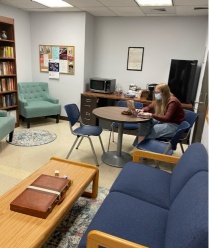
The Graduate Lounge
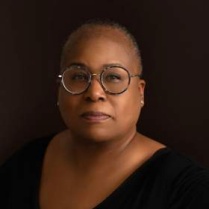
Robin Mitchell
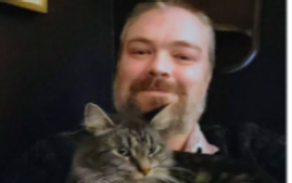
Mitchell Jones attended the Communal Studies Association Annual Conference at the Ephrata Cloister in Ephrata Pennsylvania, where he presented his paper “Enchanted Motor Power: A New Materialist Approach to John Murray Spear’s Electric God, 1830-1872.” He also published a book review, “Review of Fourierist Networks of Reform: The Social Networks of Nineteenth Century Reformers by Amy Hart,” Communal Societies 42, no. 2 (2002): 60-63.

Beth Pryor was named a Humanities Institute Advanced PhD Fellow for the 2024-2025 academic year. Advanced PhD Fellows are awarded $12,000 each, over the course of the academic year. The HI PhD Fellows participate in works-in-progress seminars, facilitated by the Humanities Institute Director and Interim Director. These seminars are the core of the interdisciplinary focus of the Humanities Institute fellowship program; they are a valuable dialogue for getting feedback on the Fellow's dissertation and for meeting advanced PhD students outside their home departments.
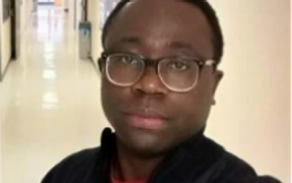
Chijioke Ngobili continued his work on his project “Unlinked Links: A Transnational History of the City of Buffalo’s Involvement in the Nigeria-Biafra War, 1968-1970.”
During the Spring semester (January–May) of 2024, PhD student Chijioke Ngobili embarked on researching the various levels of involvement of the city of Buffalo residents in the Nigeria-Biafra War between 1968 and 1970. It is arguably the first time a historian would use the University at Buffalo Archives and Special Collections for this subject as well as the first time the city of Buffalo actively interfaces with an African state in a historical discourse. Conceived during the Research on Transnationalism (HIS 606) classes taught by Professor Sasha Pack, Ngobili’s research investigates “how a network of mostly independent links of persons, groups, memories, passions, and ideologies aspired and worked from a micro space (Buffalo) toward the realization of a particular goal in and for a cross-border macro space (Biafra).” This argument is condensed into what he theorizes as “unlinked links,” and which is the leading portion of the work’s title. The draft is currently undergoing some expansion and refinement for publication in any academic journal of transnational studies or war. In terms of approach, it combines archival research in Buffalo, cross-border interviews with various persons (in Buffalo, across the US, and Nigeria) and memorial uses of pictures while drawing on the transnational historiographies of war and the Global 1960s.
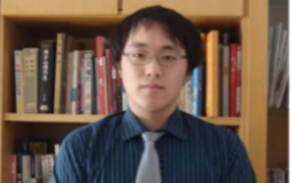
Shu Wan became a book review editor on H-Net's subchannel H-History and H-Theory.
He has published numerous works, including “TikTok Asian History of Science,” Historical Studies in the Natural Sciences, 54 (1), 115-117, 2024, “The Formation of the Deaf Community in China, 1887-1945,” Review of Disability Studies: An International Journal 18 (4), 2024, “After 1989: Independent Federation of Chinese Students and Scholars and Chinese International Students Activism in America,” in International Student Activism and the Politics of Higher Education, New York, Lexington Books, 2024, “The Door is a Mirror,” MAI: Feminism & Visual Culture, 2024, and “The Chinese in the Prairie: Chinese Iowans’ Reactions to the Covid-19 Pandemic,” Routed Magazine, 2024.
His reviews include “Review of Place-Based Community Engagement in Higher Education: A Strategy to Transform Universities and Communities,” GSLR: Recentering, Reprioritizing, and Reengaging a Sense of Community within International Education, 2024, “Review of Ideology and Libraries: California, Diplomacy, and Occupied Japan, 1945–1952.” Libraries: Culture, History, and Society, April 10, 2024, and “Review of Williamson, Bess; Guffey, Elizabeth, eds., Making Disability Modern: Design Histories.” H-Material-Culture, H-Net Reviews. February 2024.
Milton Plesur Scholarship
- Damilola Fagite
- Mitchell Jones
- Kevin Kostin
- Jenna Labbie
- Alyssa Martin
- Chijioke Ngobili
- Michael Samul
- Jessica Sullivan
- Tory Nachreiner
Milton Plesur Memorial Scholarship
- Damiola Fagite
Reilly Tirone Fellowship
- Chijioke Ngobili
Message from the Director of Undergraduate Studies
Our undergraduate program thrives! The History BA program and the UB Teach program in History ‒ UB’s accelerated, combined degree program that allows students to earn a History BA and a Social Studies Education MA in five years ‒ are among the most popular programs in the College of Arts and Sciences. We are also adding exciting new courses to our course offerings; this year, a record number of five, including History in Film (Vardi, Daum), War and Society (Vardi), Black Behind Bars (Emberton), Medicine in Africa and the African Diaspora (Williams), and Drugs and Global Capitalism (Herzberg).
We continue to recognize our undergraduates’ multiple achievements through a broad array of scholarships and prizes awarded at our graduation ceremony in May. In addition, the Early Recognition Award is an incentive for students to excel during the fall semester already. For the third year in a row, we have a cohort of over ten accomplished students participating in the History Honors Program. Furthermore, we will resume a series of social activities, including a Movie Night at the beginning of the semester (starting with Casablanca) and a dinner for our honors students. The department is delighted that some of our students founded a History Undergraduate Association this past spring with club president Fiona Serrano. This association meets regularly and offers our students a mix of academic and social events. The department plans to provide students with more opportunities for internships ‒ alums: please let us know if you see potential in your respective institutions!
Through all these initiatives and our continuous commitment to providing students with intellectual guidance, close mentoring, and encouragement, the department also strives to respond to the college’s increased demands for high enrollment in undergraduate classes. This is a communal effort, and I want to thank all History faculty for their efforts, including Professor Cari Casteel, who leads our local chapter of Phi Alpha Theta, the National History Honors Society, as well as the college’s History advisors, Louise Lalli (for UB Teach), Meredith Volker and Shilah Richardson. Internally, our program profits immensely from having Jennifer Darlak as the new undergraduate and graduate coordinator and Michelle Burger, our department administrator, responsible for countless day-to-day tasks.
Andreas Daum
Director of Undergraduate Studies
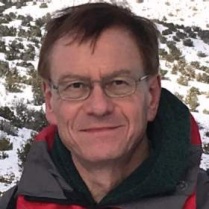
Andreas Daum
We are also adding exciting new courses to our course offerings; this year, a record number of five, including History in Film (Vardi, Daum), War and Society (Vardi), Black Behind Bars (Emberton), Medicine in Africa and the African Diaspora (Williams), and Drugs and Global Capitalism (Herzberg).
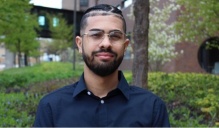
Russel Bassarath '23
Russel Bassarath, a 2023 History alum, member of Phi Alpha Theta, and current UB Teach graduate student, won a Fulbright award in 2023. He spent the 2023-24 academic year in Cyprus teaching English. The Fulbright Program is regarded as one of the world’s most prestigious scholarship and international exchange programs.
Fiona Serrano, a senior in our History program who is also majoring in two other subjects, has won one of two 2024 Nels Andrew Cleven Founder’s Prizes awarded by the National Office of Phi Alpha Theta (PAT) for her paper “Stalin’s War on Women: Gendered Violence in the Gulag.” She was also awarded an Undergraduate Scholarship by the Gender Institute and Experiential Learning Network.
College of Arts & Sciences 2024 Outstanding Senior in History
- Taynia Atallia Brown
Milton Plesur Scholarship
- Armand Correnti
- Jacob Klink
- Alexia Lodes
- Elizabeth Mellors
- Brian Peter Murphy
Joyce J. and John D. Milligan and Family Scholarship
- Taynia Atallia Brown
- Elliot Seminario
Best Undergraduate Thesis Prize
- Elliot Seminario
Milton Plesur Memorial Scholarship
- Katherine Cartenuto
- Taynia Attalia Brown
- Elliot Seminario
Bryan C Argo Memorial Scholarship
- Clair E Holody-Gaiek
John T. Horton History Scholarship
- Brennan Spruck
- Zachary Shannon
Norbert L. Fullington History Award
- Brendan Reilly
- Lazar Gordon Gelflan
Best Undergraduate Seminar Paper Prize Honorable Mention
- Nicholas Sarris
Selig Adler Memorial Scholarship
- Alyssa Abass
- Lazar Gordon Gelfland
Julius W. Pratt Memorial Scholarship
- Lazar Gordon Gelfland
- Alyssa Abass
Undergraduate Diversity Scholarship
- Fiona Serrano
Best Undergraduate Seminar Paper Prize
- Fiona Serrano
Early Career Recognition Award
- Nicholas Sarris
- Lauren Phung
- Bernie Novacovi
Phi Alpha Theta Update
Phi Alpha Theta at UB continues to grow. It has been a busy year.
This year, we inducted 22 new undergraduate and graduate members. Last September, we held our annual PAT-sponsored Welcome Event for new and returning history students. The event was a success, and this year’s 3rd Annual Welcome Event is scheduled for Oct 11.
Now to the big news…
In April, PAT hosted the Western/Central New York Regional Conference here at UB. Thanks to department staff and student workers, the conference was a rousing success. Over 100 students, faculty, staff, and friends from across the region attended. We heard an excellent keynote from Dr. Carole Emberton. Six of our own members presented their work: John Root, Sarah Wack, Fiona Serrano, Elliot Seminario, Elizabeth Mellors, Bradley Gearhart. Fiona and Sarah won paper awards!
Finally, just a few days ago, we learned that Fiona Serrano won the Nels Andrew Cleven Founder’s Prize awarded by the National Office of Phi Alpha Theta for her paper “Stalin's War on Women: Gendered Violence in the Gulag.”
I am excited about what is to come in 2025!
Cari Casteel
Phi Alpha Theta Chapter Adviser
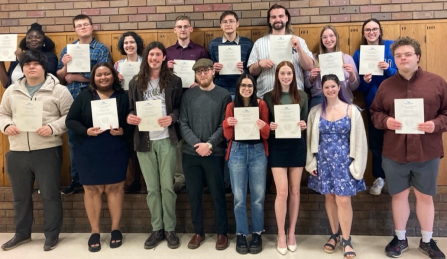
2024 Phi Alpha Theta Induction Ceremony
Undergraduate History Association
There’s a new club on campus! Fiona Serrano describes below the new Undergraduate History Association – how it came to be, what its purpose is, and what it’s been up to so far:
The Undergraduate History Association is a club for people—majors or not—that love history. Our events range from games like jeopardy and trivia to lectures from speakers in various departments around campus. There is something for everyone to enjoy. We don’t require a serious commitment; the meetings are designed for people to come to the events that interest them!
The Undergraduate History Association was born out of a desire to create a space for history students to meet one another and share their love of history. Community is essential but it can be hard to meet people in classes. The club offers a low-stake, entertaining way for students to get to know one another, building stronger relationships. Furthermore, we are committed to promoting diverse histories within our lectures and events. These are core values imbedded within the Undergraduate History Association. Department of History alumni Atallia Brown, Elizabeth Mellors, Theresa Sciandra, and Elliot Seminario founded the club last year and built the strong foundation that has allowed the club to thrive. Of course, none of this would be possible without our wonderful club advisor Dr. Handley-Cousins, who has been an integral part of the club since its origins.
This semester we have held various events. We have kept the tradition of history Jeopardy, while introducing some new interesting games. We welcomed Dr. Victoria Wolcott to speak at our first lecture of the year. She spoke about what professors’ lives look like outside the classroom and her journey to tenure. Late October, we are so excited to invite Global Gender and Sexuality Studies professor, Dr. Marla Segol, who will be giving a lecture on queer and trans mysticism. There are many great events coming soon to keep an eye out for. UHA meets weekly on Monday evenings and we hope to see you there!
Fiona Serrano
President of the Undergraduate History Association
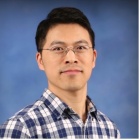
Alumni Spotlights
Xiangli Ding, PhD 2018
Xiangli Ding earned his PhD in our department in 2018 and is currently an associate professor at the Rhode Island School of Design. He recently spoke on campus about his new book, "Hydropower Nation: Dams, Energy, and Political Changes in Twentieth-Century China" (Cambridge 2024) at the invitation of the Asia Research Institute. Below he answers our questions about his time at UB, his career, and his research.
What originally motivated you to pursue a degree in history? How do you feel that these motivations continue to inform your life and work?
There were two motivations for me to pursue a degree in history. First, as a first-generation college student, I knew little about non blue-collar careers other than teaching. My high school history teachers were very knowledgeable and supportive. I was fascinated by the historical stories learned at school and wished to become a storyteller like them. Second, curiosity in learning new knowledge. It motivated me to pursue a graduate degree in history. Curiosity continues to motivate me to explore new research topics and build connections between the past and present.
What do you feel was most valuable for you in your experience at UB?
Getting the chance to work with many professors, especially my advisors Dr. Roger Des Forges and Dr. Kristin Stapleton, was the most valuable UB experience for me. Their patience and generous support were indispensable for my growth as a graduate student.
What are you teaching this year? What are your favorite courses to teach?
I am teaching Modern China, a survey of modern Chinese history this semester. In addition to Modern China, I also enjoy teaching Environment and Power in East Asia, a seminar which explores the entanglement between environmental changes and political powers in East Asia.
Has China’s hydroelectric program been impactful on its international relations? What do its neighbors think about damming rivers that my flow into another country?
Definitely. Infrastructure projects, including hydropower programs, are always tied with international relations. It could be seen in the Sino-US collaboration in the 1940s, Sino-Soviet alliance in the 1950s, China's aid to Albania in the 1960s, and the current Belt and Road Initiative across Asia and Africa. China's Southeast Asian neighbors are concerned about China's damming of the upper stream of the Lancang-Mekong River because of the negative impact on the riverine ecology and fishing resources in the lower stream. I hope there will be more constructive dialogues and international cooperations to address these concerns.
I know you discuss the Sanmenxia hydroelectric project in your work, but can you speak for a moment on the human impact of these projects? Do you see your work as contributing to a dialogue on the humanitarian impacts of China’s hydroelectric policy?
Sure, human impact, in the form of reservoir displacement and resettlement, was an important component of hydropower development in China. Under the influence of radical Maoism and rural collectivization policy in the late 1950s, reservoir residents of the Sanmenxia project were not fairly compensated. My work elaborates on the human cost of the mega project. By foregrounding the "unimagined communities," it brings environmental justice in the discussion of state energy policies.
Can you tell us something about yourself that we wouldn’t find in your CV?
I love soccer and follow Arsenal. I hope they can win the premier league this season. Go Gunners!
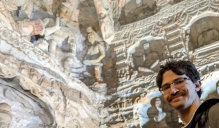
Phillip Guingona, PhD 2015
Phillip Guingona earned his PhD in our department in 2015 and is currently assistant professor at Nazareth University. He recently spoke on campus about his new book, "China and the Philippines: A Connected History, c. 1900–50" (Cambridge 2023) at the invitation of the Asia Research Institute. Below he answers our questions about his time at UB, his career, and his research.
What originally motivated you to pursue a degree in history? How do you feel that those motivations continue to inform your life/work, etc.?
Great Question. There are layers to my answer. The stories of course drew me in, as did the amazing teachers who told them. I still remember learning about Zheng He’s treasure fleets arriving on the east coast of Africa in the fifteenth century. It was such a wonderful thing to imagine, and it made me want to learn more. I continue to be inspired by folks from the past, although now it is usually the anarcha-feminists and anti-colonial activists of the world that grab my attention. People are amazing, and I never get tired of learning more and finding inspiration from their lives.
What do you feel was most valuable for you in your experience at UB?
The people. I loved my time at UB. It was wonderful that we didn’t have a specific focus but read widely. I took classes on immigration history, comparative women’s history of South Asia and the United States, Chinese history, and much more. Everyone was supportive in their own way.
What are you teaching this year? What are your favorite courses to teach?
This year I am teaching intro to Asian history courses, the equivalent of HIS 181 at UB, historical methods, and women, gender, and sexuality in Asian history. I love teaching all my courses, and the students usually determine which are my favorite to teach. If they are engaged, then everything is fun. Content-wise, I really like some of my new courses on the history of the internet, sports history, and Asian American history.
What advice would you give to other scholars writing decolonial histories and attempting to, as you write in your book, “[foreground] actors from the Global South?”
Recognize your role and privilege, and do your best to share the thoughts and ideas of historical actors that perhaps do not find themselves in the pages of many other history books. History as a discipline, and higher education more broadly, played a critical role in formulating and articulating imperialism, racism, misogyny, homophobia, you name it. Therefore, we cannot remain neutral in the present. We must actively challenge our predecessors, and sometimes our peers. Sometimes that means calling them out, but other times that means removing them from the narrative altogether.
What do you think is the most important issue in the South China Sea today? What should people from the United States know about this region of the world?
Everything. As has been the tendency in the past, when geopolitics amplifies anxieties and conflicts in a region, like the West Philippine Sea, it is always ordinary people who suffer the most. Leaders in China, the United States, the Philippines, Vietnam, Malaysia, and Taiwan tend to frame these issues using the language of geo-politics, but it is the fishers, sailors, and even soldiers in this region who have to live with everyday humiliations and fear. Any misunderstanding could easily result in an international conflict, and ultimately, I don’t envision any resolution in the near term.
Can you tell us something about yourself that we wouldn’t find in your CV?
I enjoy a well-placed pun.
Alumni Updates
Shanleigh Corrallo started as a Mellon Postdoctoral Fellow for the National Parks Service. The title of her fellowship is “Revolutionizing the Narratives at Schuyler’s Estate, Saratoga” and will take place at the Saratoga National Historical Park in Stillwater, New York. Dr. Corrallo will study and develop methods of sharing a variety of under-told, silenced, and undiscovered stories at the Schuyler Estate. This historic house and landscape represents many intersectional histories, including those connecting ethnicity, race, gender, and class.
James Coughlin, since completing his MA and prize-winning thesis on racial segregation in Buffalo, has started a job with Housing Opportunities Made Equal (HOME) and continues to be very involved in local activism. Most recently he has spearheaded efforts to seek exoneration for Geraldine Pointer and Martin Sostre. Sostre (now deceased) owned the Afro-Asian bookstore, a center for Black activism during the late 1960s and a hangout for UB students who could purchase books not available on campus. Pointer was an employee of the bookstore. Both were set up by the FBI in the wake of the 1967 racial uprising in Buffalo and spent years in prison on trumped up drug charges. James has organized two events this past summer to publicize the calls for their exoneration.
Brent Rosenstein is a former PhD student in the Department of History at UB and presented “A Live Supervised: Dragoman Families and the Eighteenth-Century State” at the 2024 Annual Meeting of the French Colonial Historical Society in Charlottesville, Virginia. The society will be publishing his work for the first time in their upcoming journal.
Averill Earls, along with Sarah Handley-Cousins, Marissa Rhodes, and Elizabeth Garner Masarik, co-authored "Spiritualism’s Place: Reformers, Seekers, and Séances in Lily Dale" and is being published by Cornell University Press on October 15, 2024. Additionally, her book "Love in the Lav: A Social Biography of Same-Sex Desire in Ireland 1922-1972" is in production with Temple University Press. In 2023, she won a NEH Summer Stipend and was a North American Conference on British Studies-GALE Digital Scholars Fellow. She is living in the Twin Cities, Minnesota area and is an Assistant Professor of History at St. Olaf College since Fall 2022.
Eugene R. Foels is a former MA student in the Department of History at UB and has published multiple works on the history of Tonawanda High School athletics, including "100 Years of Dynamite: The Story of T-NT Football (2009) and Smallball: A History of Tonawanda High School Baseball 1970-79" (2024). He is currently working on additional titles covering Tonawanda High School swimming from 1946-1972 and the history of Syracuse University Football from 1956-1967.
Two of UB’s VITAL scholars from previous years have news to report. Daniel Morales-Armstrong, VITAL Scholar in 2022, passed his dissertation defense and is now Dr. Morales-Armstrong. Udodiri R. Okwandu, VITAL Scholar in 2022, accepted a Presidential Postdoctoral Fellowship at Rutgers University, in affiliation with the Women, Gender, and Sexuality Studies Department and the Department of History.
Robert Murrett (BA, History, UB Class of ’75) is in his 12th year as a Professor of Practice at the Maxwell School of Syracuse University. He came to SU after 34 years in the U.S. Navy, retiring in the grade of Vice Admiral. Throughout both these careers, he relied upon his grounding in history extensively, often telling audiences that the Navy career was “applied history.” Of more importance, he met Judy Hildreth Murrett at UB (they were both RA’s). They have been married for 44 years, and now in addition to three children have four grandchildren. He has returned to UB several times over the years, most recently as the speaker at the recognition ceremony for UB Veterans this past April. “It’s great to see the Department of History continue to thrive,” Murrett writes, “and the impact that is continues to have on so many career fields for UB alums.”
Stephanie Petkovesk received her MA from UB’s Department of History and taught French and Social Studies at Cheektowaga Central High School and Greeley West High School in Greeley, Colorado for 14 years before moving back to New York State and starting at SUNY Canton as a History lecturer. This is her 12th year at SUNY Canton and she is currently serving as a Senior Lecturer there as well as the United University Professions (UUP) Chapter President. She teaches the US Survey Course as well as two courses she designed, US Immigration History and African American history. In her free time, she runs a book club for the Slovenian Union of America which focuses on Slovenes and Slovenian Americans using historical novels, fiction, and non-fiction to enrich our understandings of Slovenian heritage. Stephanie also serves on the board of Cinema 10, a nonprofit group that brings independent, foreign, and documentary films to the North Country for 10 films each semester.
Thank you for your support of the Department of History! With the support of alumni and friends, we can access vital resources to enhance our department and provide support for students, research projects and programs. We are grateful for your generosity.
You can support your department and help to provide for our students by making a gift online.
If you prefer to make your gift by check, please make your check payable to the University of Buffalo Foundation, write “Department of History” in the check memo line, and send it to:
University at Buffalo Foundation
Box 730
Buffalo, NY 14226-0730